The gray area between dating and a committed relationship has gone by many names over the years: “friends with benefits,” “booty calls,” and “casual sex.” First introduced into the American lexicon in a Cosmopolitan article from 2017, the latest term is “situationship” and loosely means “a hookup with emotional benefits.”
To better understand how people view situationships, the proportion of people who’ve engaged in them, and their nuances, we surveyed 1,079 adults. Read on to find out what the public thinks about the idea as it becomes more well-known.
Key Takeaways:
- Forty-five percent of Baby Boomers surveyed have been in a situationship, compared to 32% of Gen Zers.
- Sixty percent of all respondents either are currently or have been in a situationship.
- One in five Gen Zers say the risk of settling for the wrong person is their main reason for avoiding commitment.
- Thirty-eight percent believe situationship means the exact same as the phrase “friends with benefits,” while 41% say they’re just similar.
- One in four people currently in a situationship met the other person on a dating app.
- Ninety-two percent of Americans feel that stigmas are attached to being in a situationship.
- Top concerns about situationships include: lack of meaningful connection (21%), confusion about boundaries (18%), and feeling used (15%).
- Women are 10% more likely than men to believe there are no benefits to being in a situationship.
3 in 5 People Have Been in a Situationship
We were surprised to discover that 60% of American adults claim that they have either currently or previously been in a situationship. And of the people who haven't been in one, 7% are considering it. For this survey, we defined a situationship as “an ongoing sexual relationship with an undefined future.”
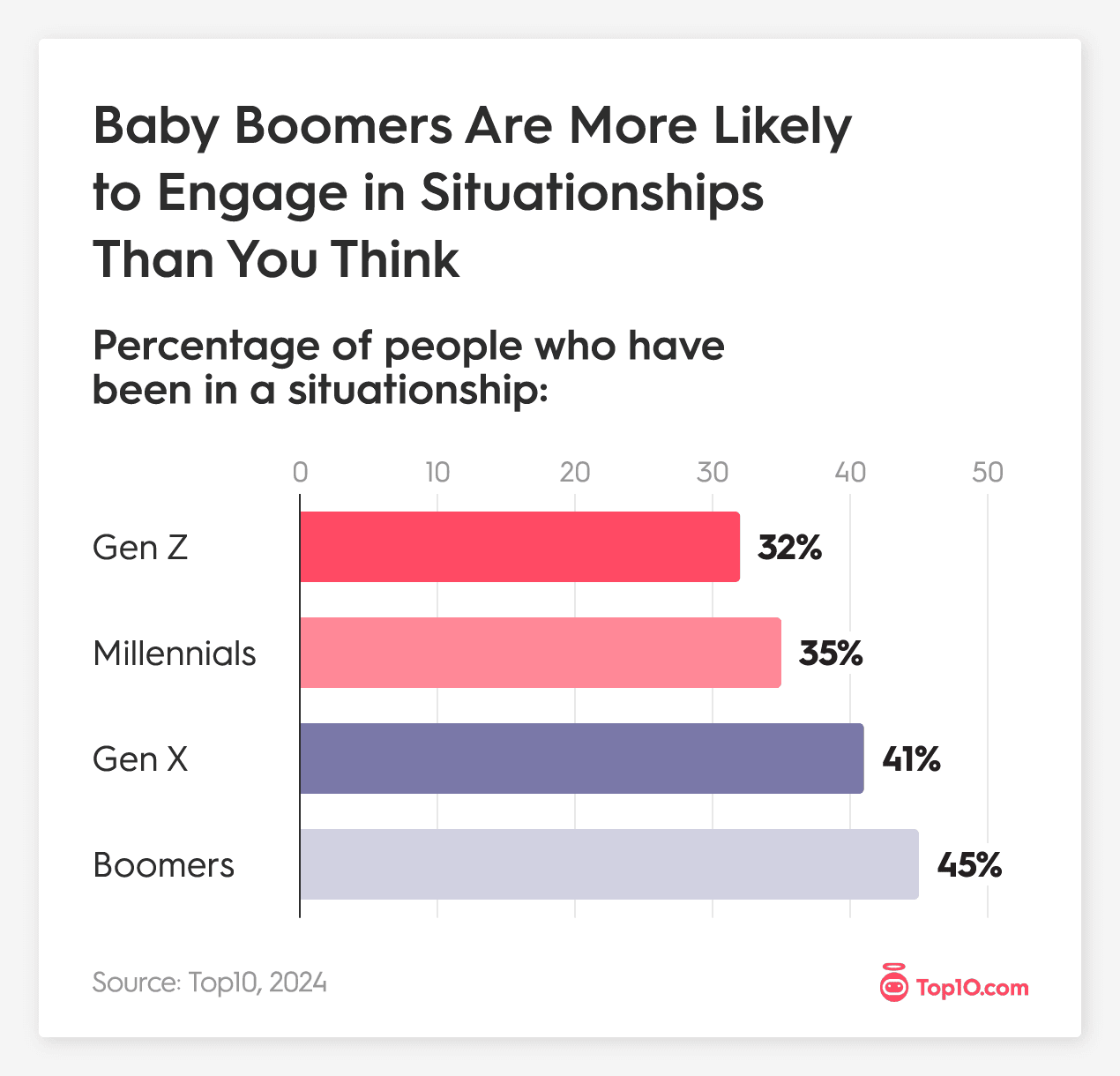
Interestingly, the percentage of respondents who affirmed experiencing a situationship decreased based on age. Forty-five percent of Baby boomers surveyed said yes, compared to 41% of Gen X, 35% of Millennials, and 32% of Gen Z.
These findings seem to indicate that situationships are not a new concept. It’s a new word for what some may think of the dating term, “friends with benefits,” or "unproductive romance." We asked the public whether they thought the phrases meant the same thing or were different. Most people agree the concept of a situationship is exactly the same (38%), or at least similar to (41%), the phrase friends with benefits.
Adults in a self-declared situationship are the most emphatic that the concepts are similar but not synonymous, at 52%. Compare that to the 44% of married respondents who selected the same answer. Perhaps it falls somewhere on the relationship spectrum between friends with benefits and no-strings-attached dating.
22% of Gen Z Are Worried About Settling for the Wrong Person
When asked what their biggest fear is around committing to a serious relationship, more than one in five Gen Z adults between the ages of 18-29 identified settling for the wrong person as their greatest concern.
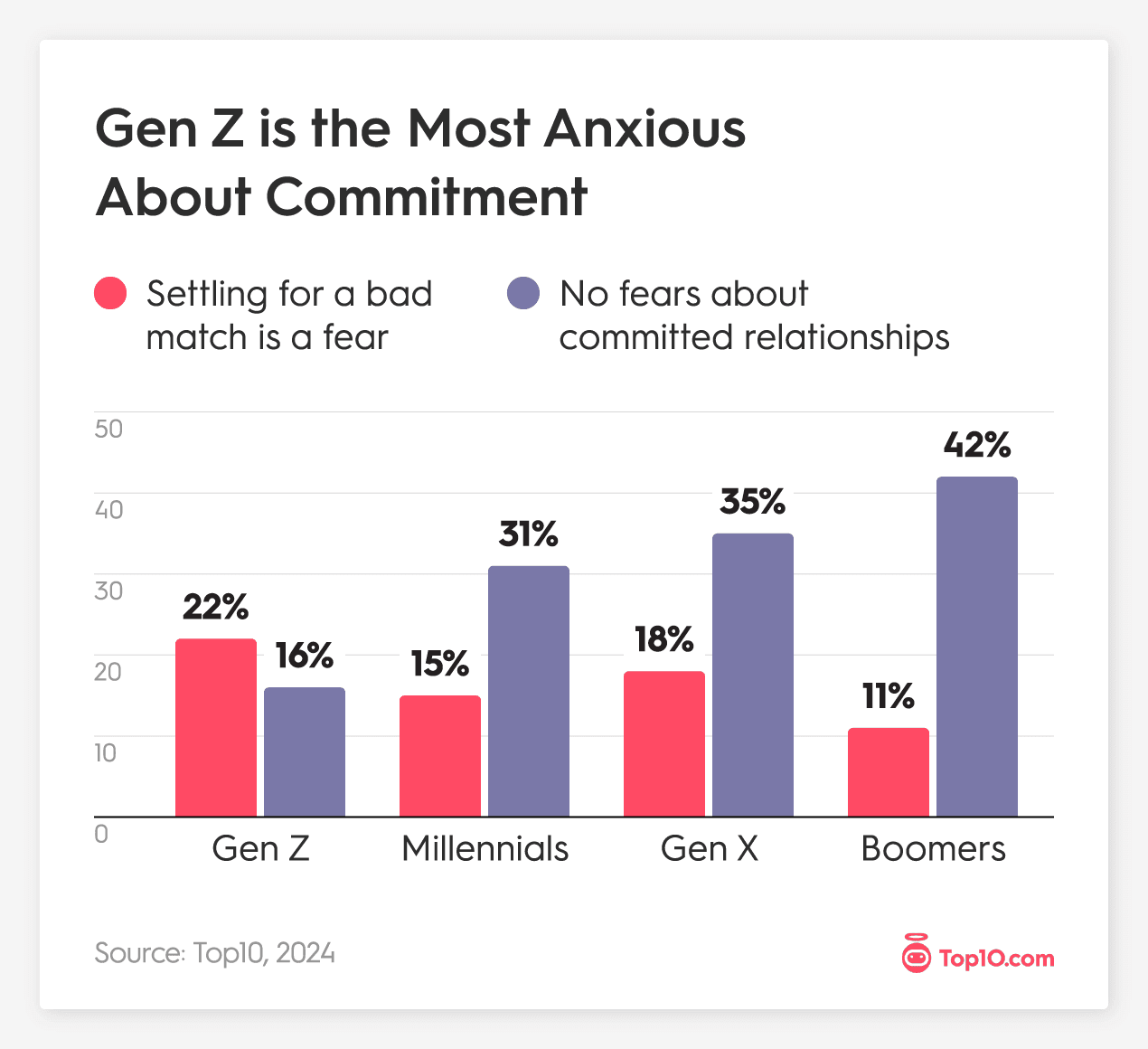
In comparison, the majority of adults over the age of 30 said they have no fears about committed relationships. The generational breakdown of people who selected the “I have no fears about committed relationships” response option was as follows:
- Baby boomers = 42%
- Gen X = 35%
- Millennials = 31%
- Gen Z = 16%
Although Baby boomers were found to be the most likely to have experience with a situationship, they are the least worried about settling in their love lives. Perhaps with age, embracing the concept of a situationship allows them to stress less about romantic relationships and they are at an age where they want to be bonded to someone to help care for their declining health.
26% of Situationships Start on Dating Apps
Twenty-six percent of survey respondents who said they are currently in a situationship indicated they have dating apps like Tinder and Bumble to thank for getting it started. Another 15% started theirs after someone slid into their DMs via social media.
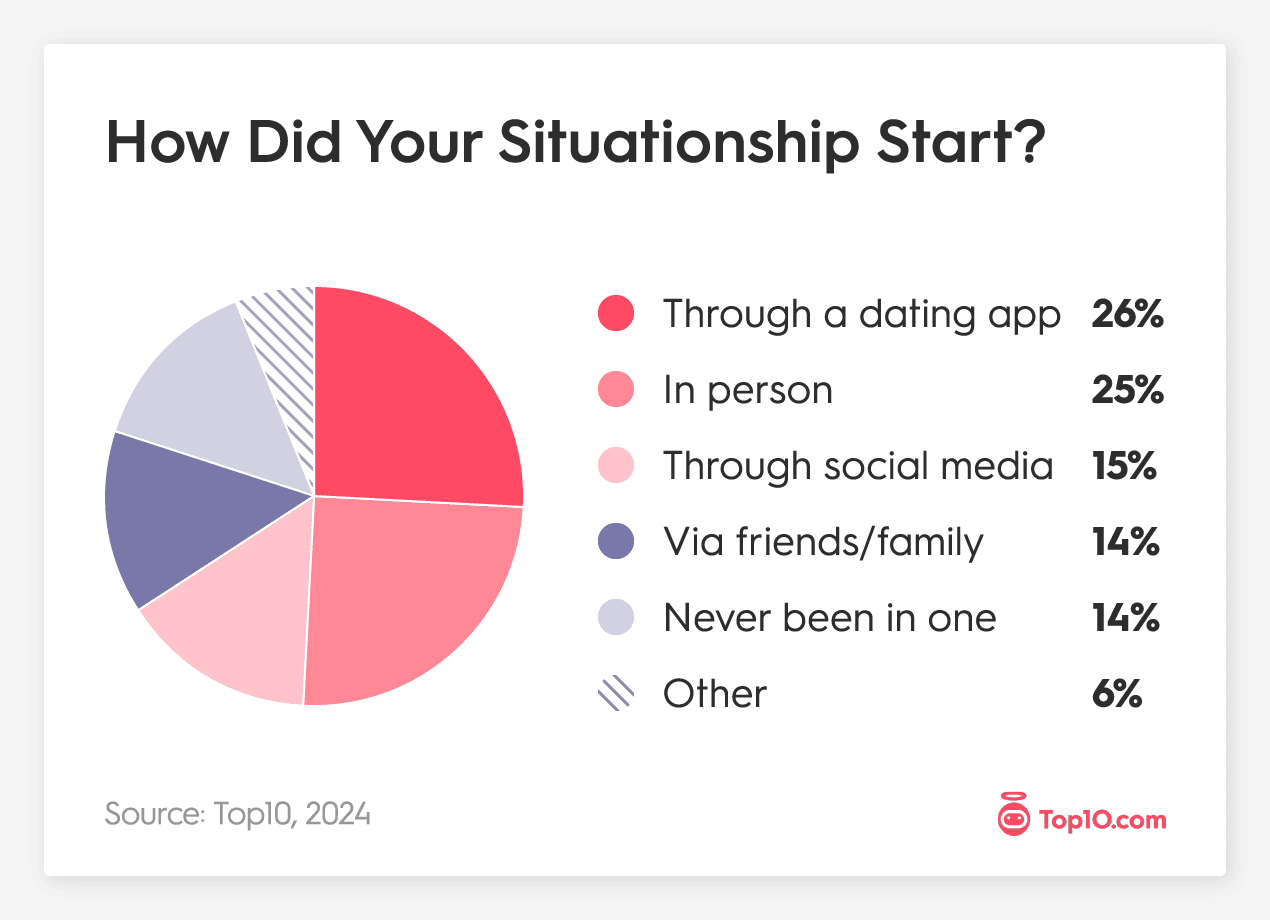
Yet old-fashioned methods remain the most common way of meeting someone. While 25% said their situationship began after initially meeting in person, another 14% stated their friends and family get the credit.
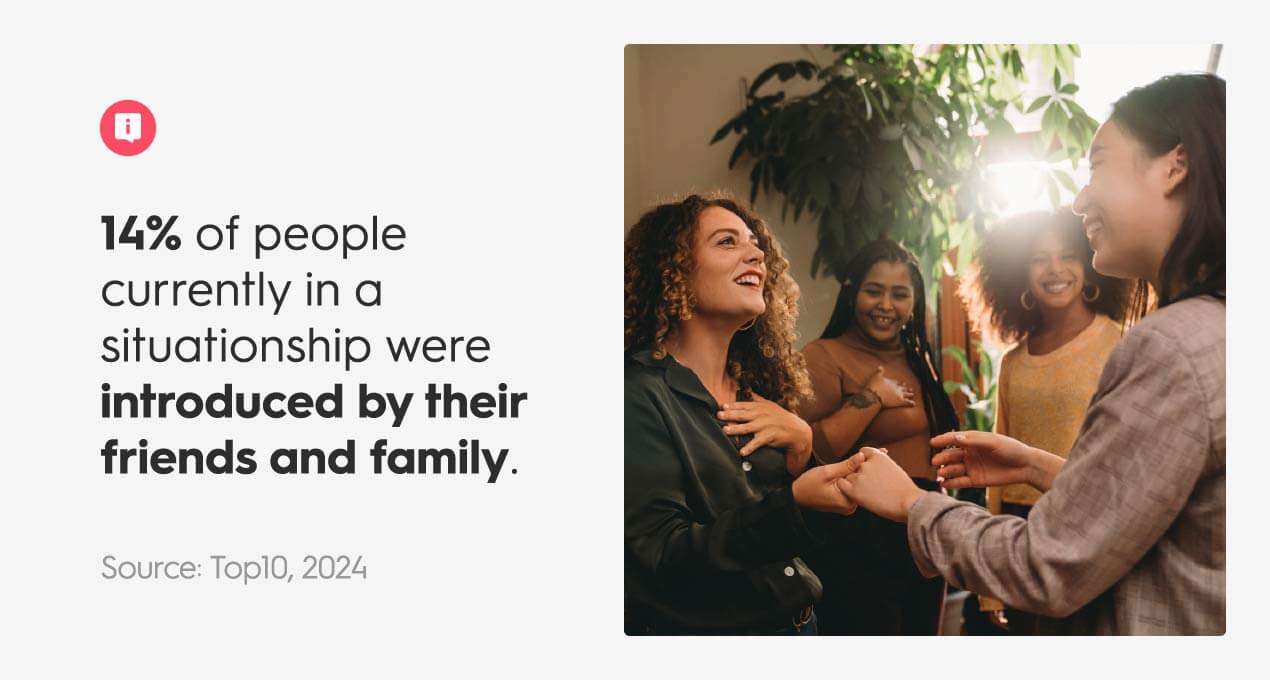
Many relationships start without needing dating apps. For those who do rely on dating apps, we asked the public if they’d be willing to recommend specific dating apps or websites that cater to people in search of a situationship. Most people said that’s not going to happen, with 49% saying it was either unlikely or very unlikely.
A generational look at this question reveals that most people lean toward not recommending situationship-friendly dating apps. Only Millennials were equally split, while Baby Boomers were the most adamant about not making a recommendation.
- Gen Z: 41% would recommend vs. 43% would not
- Millennials: 41% would recommend vs. 41% would not
- Gen X: 39% would recommend vs. 45% would not
- Baby boomers: 12% would recommend vs. 71% would not
And along the gender divide, men were 20% more likely to make those recommendations than women (47% to 27%).
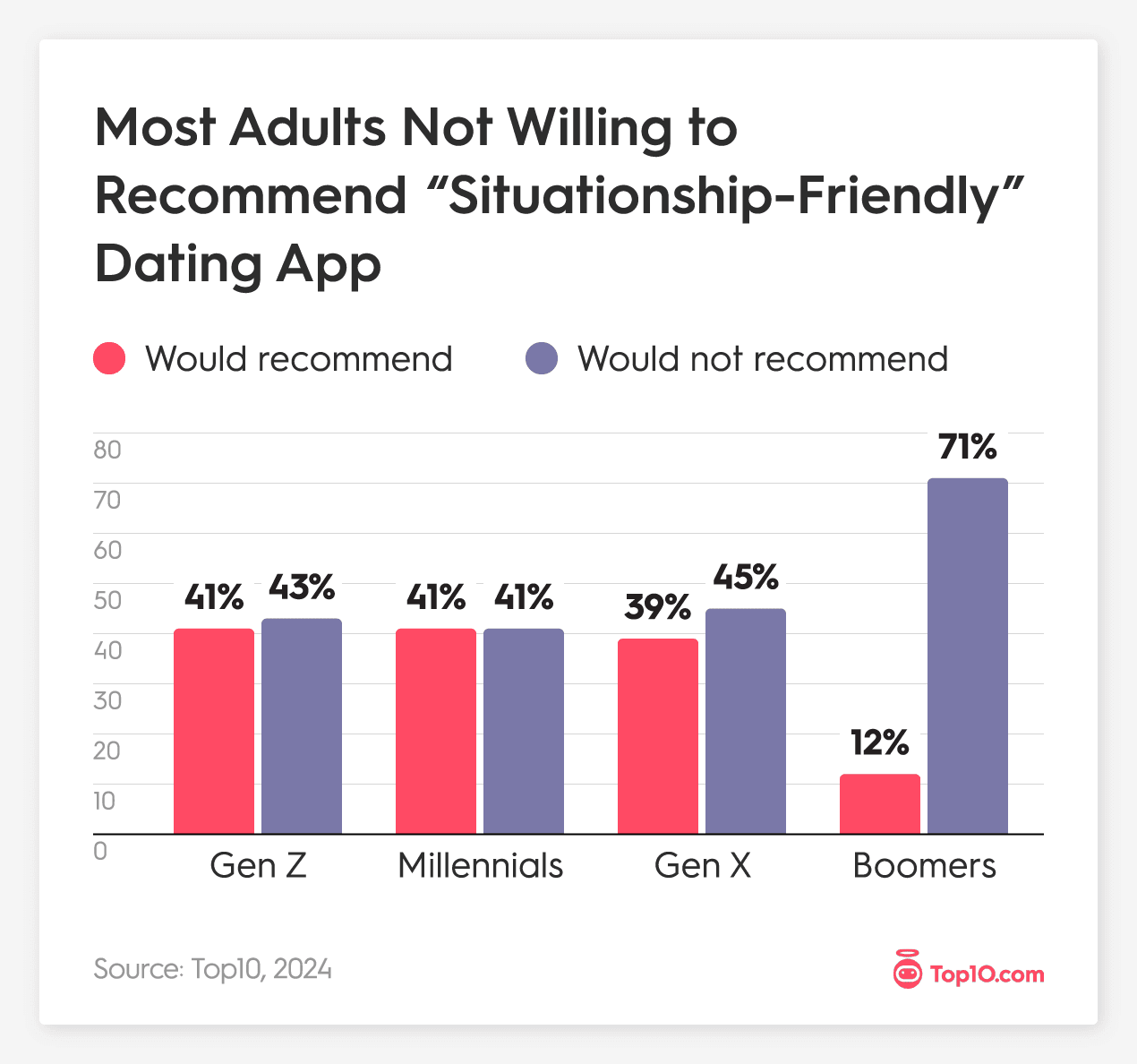
We also found that men more readily agreed with the research-supported theory that using dating apps encourages situationships because of the dependence on technology. Fifty-nine percent of men agreed, compared to 48% of women doing the same.
9 out of 10 Believe Situationships Are Stigmatized
Choosing to openly be in a situationship opens people up to potential judgment for being in an unconventional relationship. We discovered that 92% of people believe there are stigmas attached to being in a situationship, specifically.
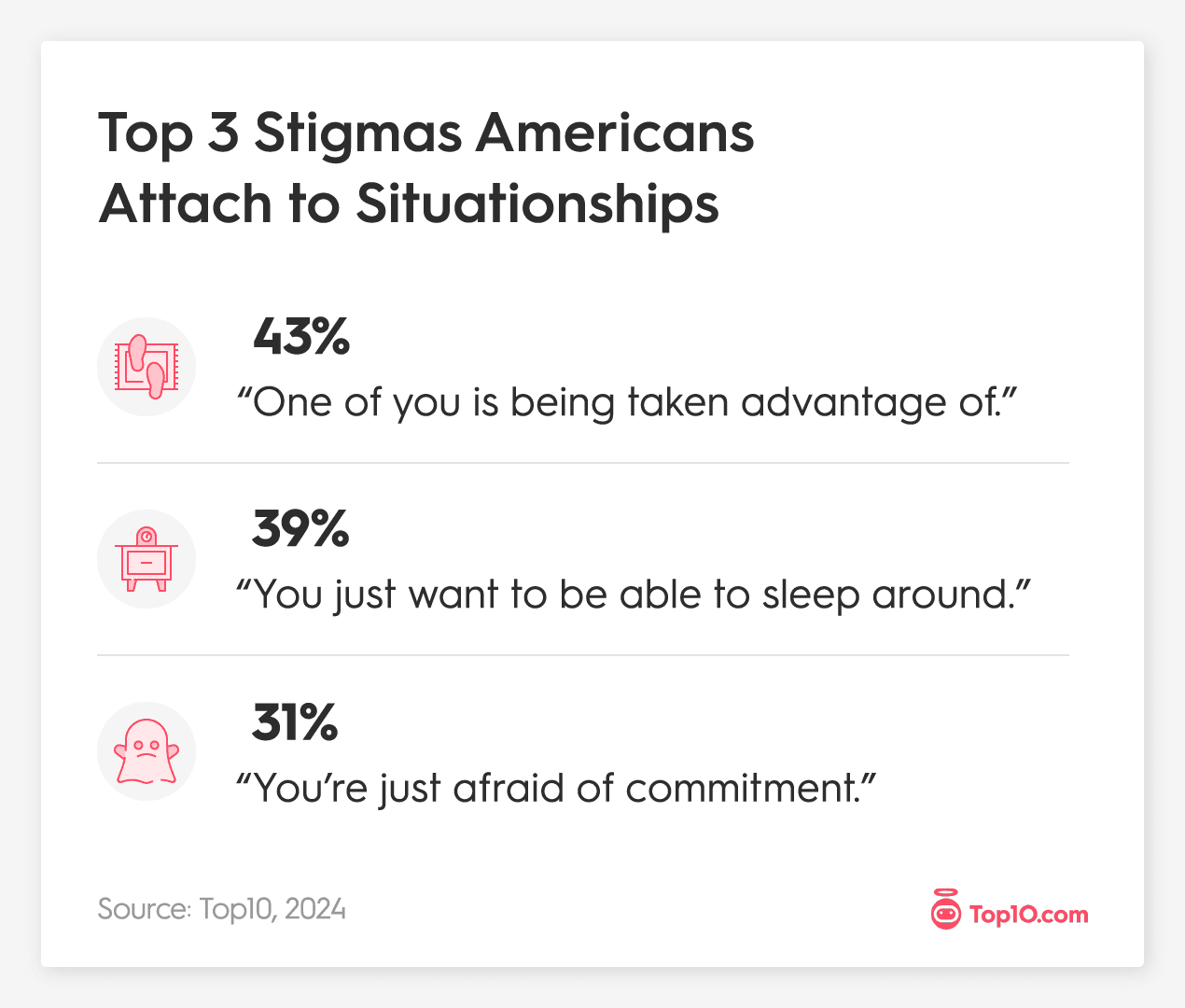
When asked which stigmas they believe might be associated with situationships, 43% felt that the couple would likely hear, “One of you is being taken advantage of.” Another 39% worried they’d hear, “You just want to be able to sleep around.” Being judged for commitment phobia was also a concern, with 31% choosing “you’re just afraid of commitment.”
Men were more likely than women to fear being accused of being in denial about a relationship, 35% vs. 24%. Thirty-three percent of women, on the other hand, appear more likely to feel stigmatized about being afraid to commit compared to men (28%).
Lack of Emotional Connection Is the #1 Fear About Situationships
21% of the public feel the presumed lack of a meaningful connection is the biggest potential drawback of being in a situationship. The second and third most common responses were potential confusion about boundaries (18%) and feeling used (15%).
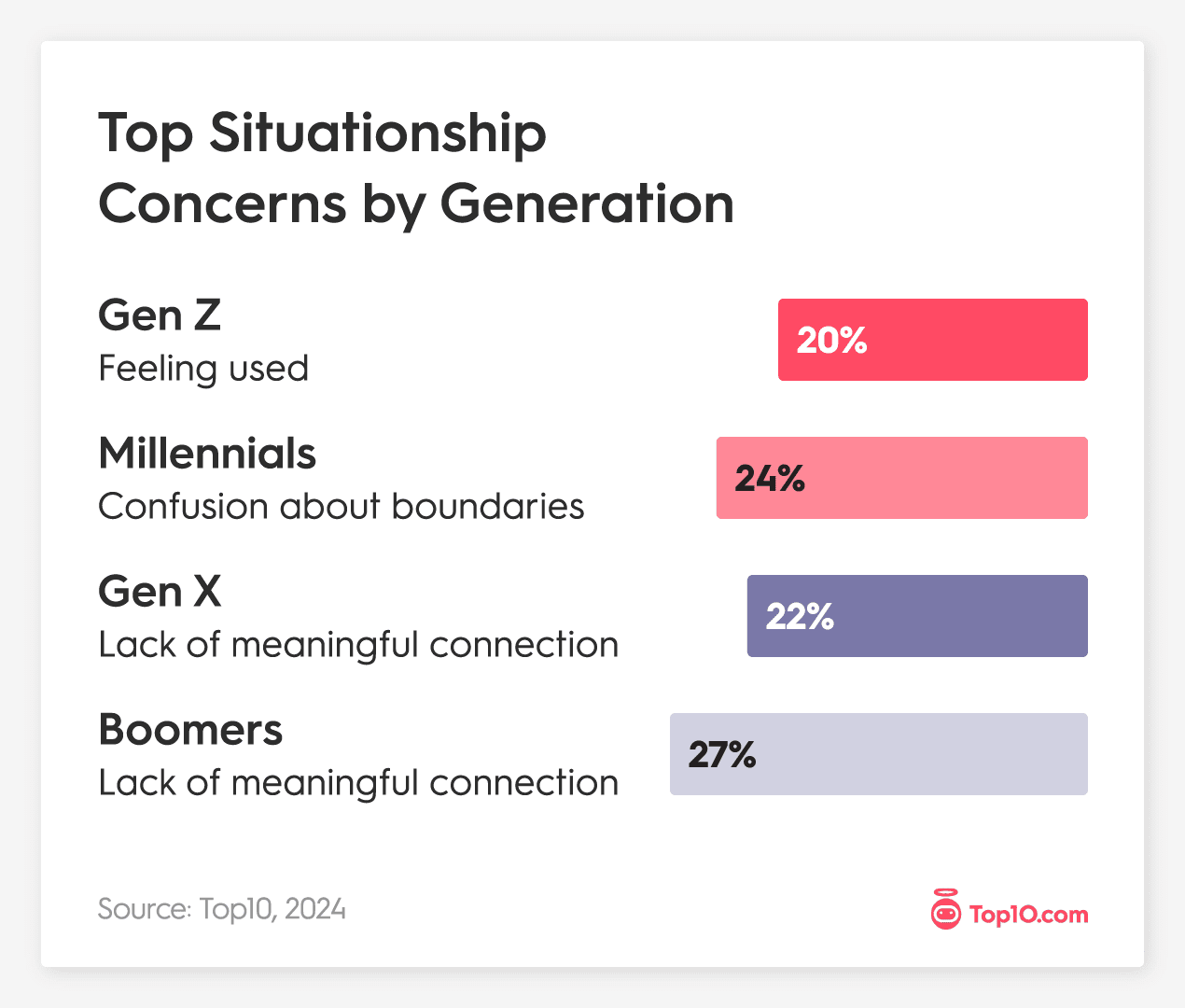
Concerns fluctuated among different generations. Boomers (27%) and Gen Xers (22%) both thought the lack of a meaningful connection was the biggest concern. Twenty-four percent of Millennials were most concerned about poor communication leading to confusion about boundaries in the relationship. And 20% of Gen Z worried most about feeling used.
1 in 5 See No Benefits to Being in a Situationship
When we looked at the positives that could be associated with a situationship, one in five people clarified that they don’t see any benefits at all. Women were 10% more likely than men to feel there were no benefits (24% vs. 14%).
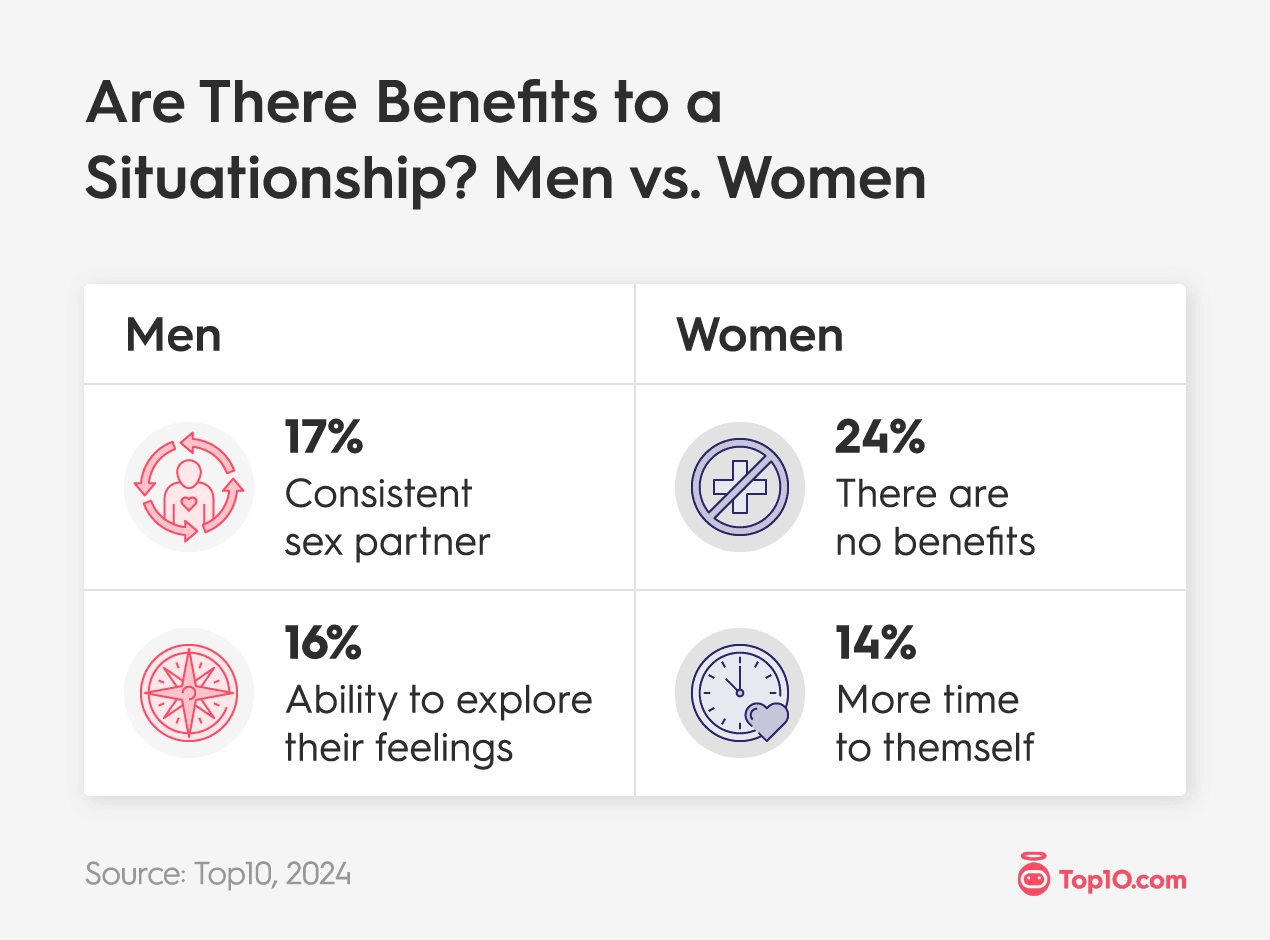
According to 17% of the male respondents, the best benefit is having a consistent sex partner. And the second best thing that 16% of men felt about situationships is the opportunity to explore their feelings for the other person.
Twenty-two percent of people currently in a situationship agreed with the guys, saying a consistent sex partner was the best part. In contrast, only 10% of married Americans felt the same.
Find the Best Dating App for The Type of Relationship You Want
Whether you're new to dating or you've dated so many people that you’ve run out of new first date questions, it's worth exploring how top dating apps can help you. Most offer a safe and secure way to connect and meet new people who are searching for the same type of relationship that you are.
Methodology
The survey of over 1,000 adults aged 18+ was conducted via SurveyMonkey Audience for Top10 on March 11, 2024. Data is unweighted, and the margin of error is approximately +/-3% for the overall sample, which has a 95% confidence level.

